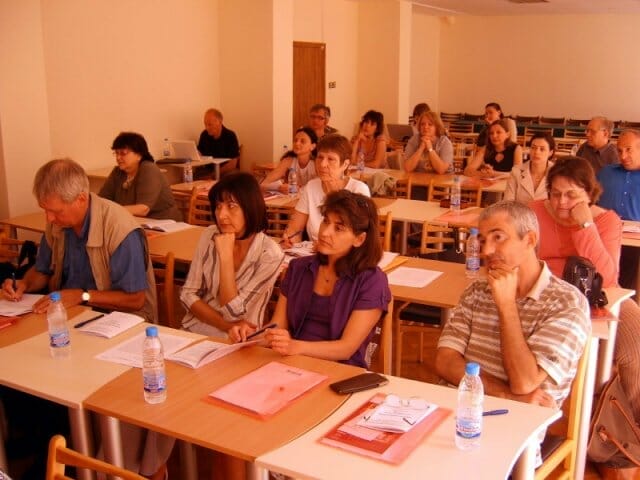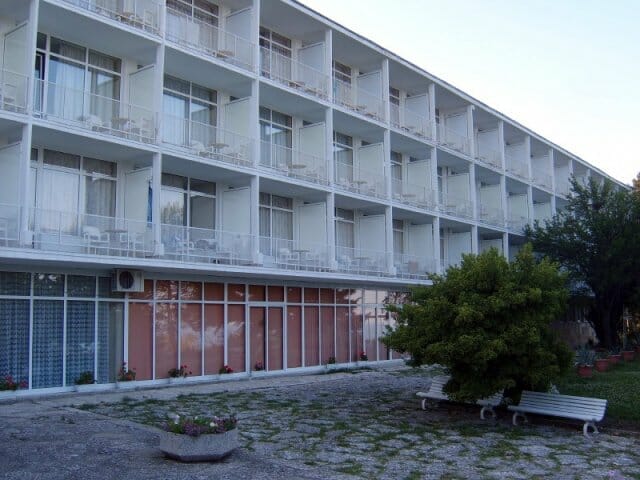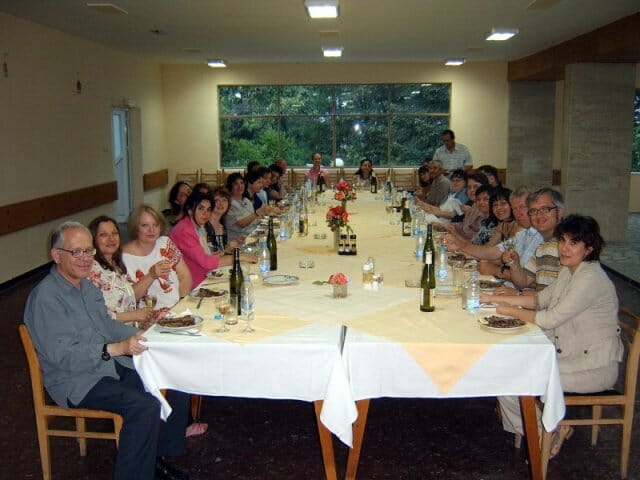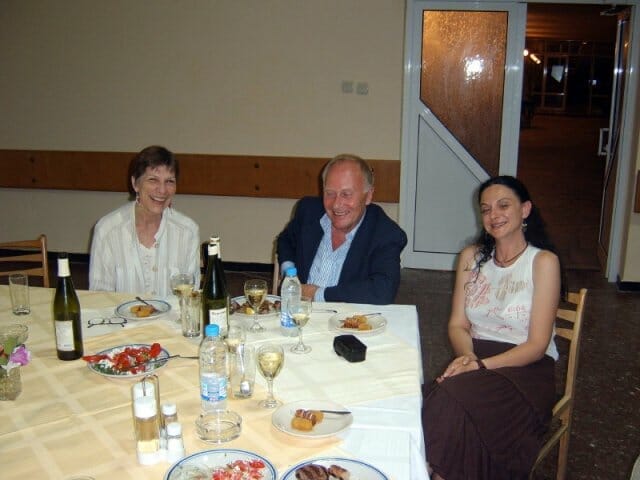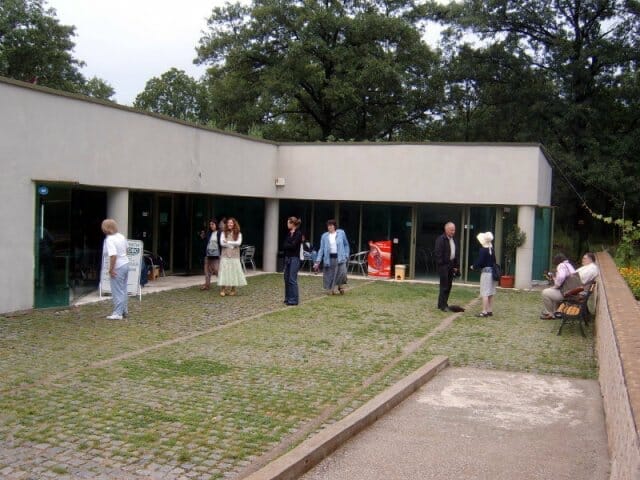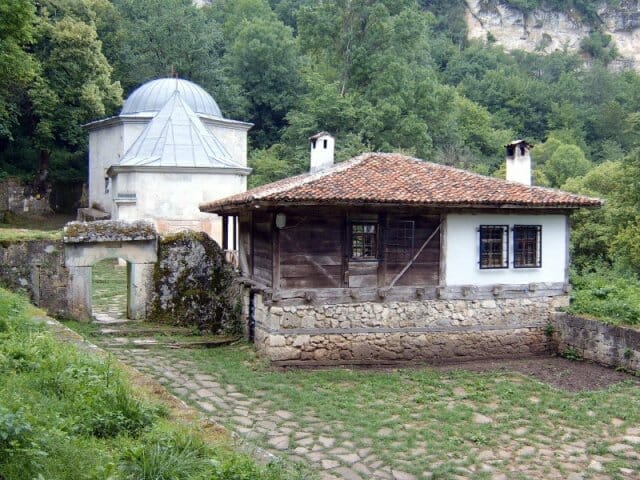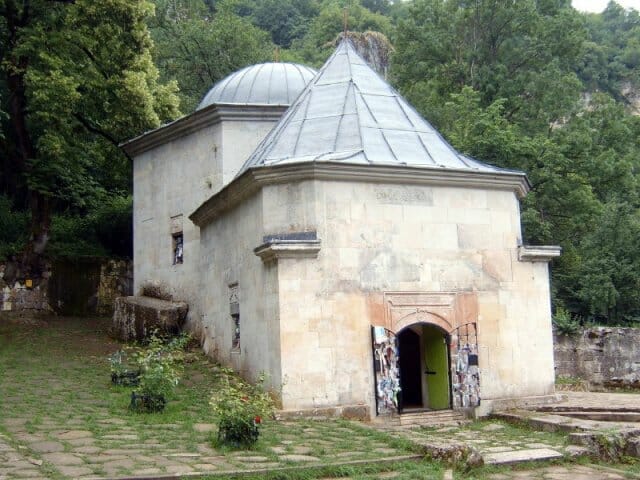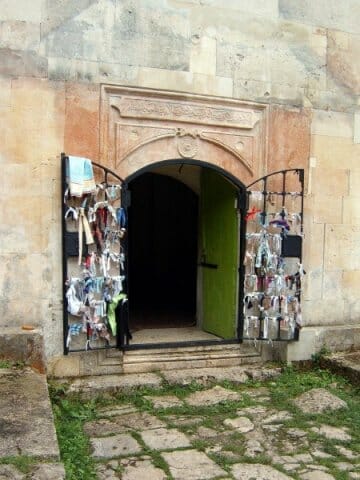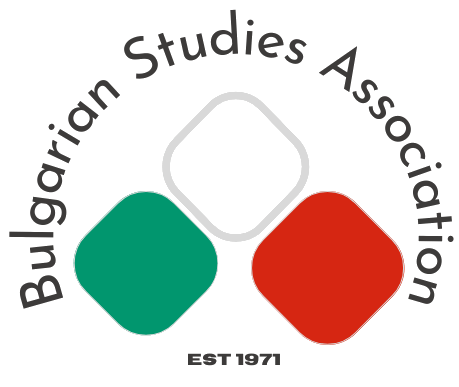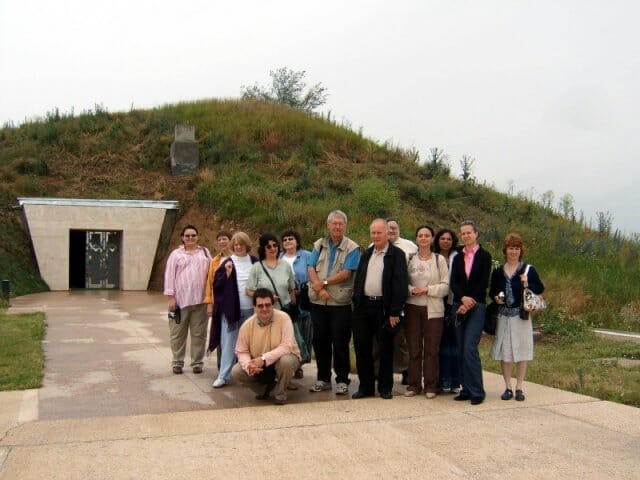
8th Joint Bulgarian-American Conference: Bulgarian-American Dialogs
13-15 June, 2008, Varna, Bulgaria
The 8th successive Joint Bulgarian-American Conference, titled “Bulgarian-American Dialogs” was held June 13- 15, 2008 at the Resort Home of the Bulgarian Academy of Sciences on the Black Sea coast near Varna. The conference was co-organized by the Council for Bulgarian Studies Abroad at the Bulgarian Academy of Sciences, and the Bulgarian Studies Association, and was funded by the Bulgarian Academy of Sciences and the Central Library of the Bulgarian Academy of Sciences. The participants presented papers on traditional interdisciplinary topics in philology, anthropology, history, sociology and culture, and on issues in new fields of study. The BSA delegation was composed of scholars in Bulgarian studies from universities in the US, Germany, Norway, and Sweden, and lecturers at the American University in Bulgaria. The Bulgarian delegation consisted of scholars from the Bulgarian Academy of Sciences (the Institutes of Literature, Bulgarian Language, History, Balkan Studies, Folklore, and Art Studies, the Ethnographic Institute and Museum, and the Cyrillo- Methodian Research Centre), St. Kliment of Ohrid University in Sofia, the New Bulgarian University, and the Faculty of The- ology at Shumen University.
The papers dealt with a variety of fields and methodological approaches in the humanities and social sciences. The Conference was opened with an address by Academician Konstantin Kossev, Vice-President of the Bulgarian Academy of Sciences, who noted the major significance of bi- lateral meetings and expressed the conviction that they would continue to play a leading role in co-operation between the Bulgarian Academy of Sciences and the Bulgarian Studies Association. Prof. Anisava Miltenova opened the Conference with an introduction tracing the work of earlier conferences at the University of Wisconsin, Madison (1974), Varna (1978), Boston (1982), Smolyan (1987), Pittsburgh
(1994), Blagoevgrad (1999), and Columbus, Ohio (2003). Special attention was given to the part that these meetings have played in researchers’ achievements and support of Bulgarian studies in the world, as well as in promotion of the study of the Bulgarian language, Bulgarian literature and culture by young Bulgarian scholars. The talk noted the enormous contribution of scholars such as Prof. Thomas Butler, Prof. Donald Dyer, Prof. John Bell, Prof. Ernest Scatton, Prof. Charles Gribble, Prof. Cynthia Vakareliyska, Prof. Fredric Chary, and Prof. Kjetil Rå Hauge.
Prof. Boryana Velcheva in her paper “Meeting American Linguistics” presented interesting reminiscences of her contact and joint work with American linguists and their role in shaping her academic interests. Prof. Kjetil Rå Hauge (University of Oslo) spoke on discourse particles in translations into Bulgarian from English. Prof. Roger Gyllin and Daniela Assenova (University of Uppsala) gave a comprehensive historical presentation on the past and future of Bulgarian studies in Sweden.
The other contributions were grouped thematically, on religion, history, language and literature, ethnography and folklore, and music. Prof. Frederick Chary (University of Indiana) presented a reexamination of the issue of the saving of Jews in Bulgaria during the Second World War. Prof. Rumen Genov (New Bulgarian University) acquainted the participants with the role of American Protestant missions to Bulgaria in the history of Bulgarian and foreign studies. Assoc. Prof. Pavel Stefanov (Shumen University) dealt with the experiences of a British officer in Bulgaria during the Crimean War as a case study in cultural anthropology. Prof. Benedict De Dominicis (American University in Bulgaria) focused on the role of the Bulgarian Orthodox Church in Bulgarian national identity in the past and present against the background of the role of Church institutions in other Balkan countries.
Prof. Marcus Wien, also from the American University, examined Bulgarian-American economic ties from 1918 to 1944. Prof. Christopher Scarboro (King’s College, Wilkes-Barre, PA) presented a typology of the organization of excursions and proximate tourism over the period 1950-1985 in Bulgaria. Prof. Voin Bojinov (Institute of History BAS) presented some little-known facts about the life and work of the American ambassador in Sofia Dominic Murphy in his paper “The Bulgarian Public, the United States and the Peace (1918)”. Lobbying and public relations for Bulgarian and Bulgaria in the U.S. were the topic of a ground-breaking paper by Prof. Detelina Dineva (Institute of History, BAS).
Another panel of papers presented joint projects of the Bulgarian Academy of Sciences and American academic centers. Among these was the project of the Institute of Ethnography at the Bulgarian Academy of Sciences and the Center for East European Studies at the University at Pittsburgh, presented by Prof. Elya Tzaneva (Institute and Museum of Ethnography, BAS). Prof. Lilljana Simeonova (Institute of Balkan Studies, BAS) presented the results of a joint study with Rice University on the role of women medievalists in the Academy. Prof. Svetla Koeva of the Institute for Bulgarian Language analyzed results of the project Bulgarian WorldNet of the Department of Computational Linguistics, funded by the European Union (5th Framework) and Bulgarian Ministry of Education and Research. She shared her experience in the context of the international initiative WorldNet and the participation of American research centers in it. Prof. Rumjana Preshlenova (Institute of Balkan Sudies, BAS) presented the paper “Education as Communication: Bulgarian-American Traditions.” A comparative analysis of doctoral programs at the University of South Dakota, USA, and Plovdiv University presented by Plamen Miltenov and Gary Schnelert (University of South Dakota) and Galin Tzokov (Paisij Hilendarski University in Plovdiv) provoked considerable de- bate. The presentation included a direct Internet phone link with Prof. Schnelert, who answered a number of audience questions. The authors placed emphasis on bilateral projects for the academic development in both countries.
A separate series of papers focused on medieval studies. Prof. Cynthia Vakareliyska (University of Oregon) compared the calendar and commemorations of saints in the Draganov Menaion (Zograph Trephologion), dated to the late thirteenth century, with the calendars of saints in the Curzon Gospel, the Banica Gospel, and the lectionary gospel/ apostolus No. 882 (from Cyril and Methodius National Library in Sofia). Prof. Iskra Hristova-Shomova (Sofia University) presented a history of translations of the Old Testament Book of Job, based on a rich collection of unpublished materials from Slavic manuscripts, analyzing the different translation strategies chosen by different bookmen working in different times and cultural settings. Dr. Tatiana Nikolova-Houston (University of Texas at Austin) examined the mentality of late medieval bookmen of the 16th-17th centuries, in a report based on marginalia from manuscripts kept at the Historical Archival Institute in Sofia.
Daniela Assenova (University of Uppsala) spoke on current problems and innovational practices in the teaching of Bulgarian language and culture in the Scandinavian countries. Her contribution reflected her dedication to promoting and modernizing the teaching of Bulgarian in universities out- side Bulgarian. She noted in her paper that Prof. Roger Gyllin (University of Uppsala) had a major part in creating the on- line courses at Uppsala University, and that as a result, hun- dreds of people in Scandinavia have been drawn to studying Bulgarian. Prof. Yovka Tisheva (Department of Bulgarian, Sofia University) presented a very interesting contribution on a number of issues in the study of contemporary Bulgarian and the future of joint studies with institutions outside Bulgaria.
She identified two major tendencies in the dynamics of colloquial Bulgarian: reduction and multiplication/accumulation in lexical and grammatical categories. Researcher Elka Dimitrova-Uilis (Institute of Literature, BAS) shared her observations on Bulgarian and American poetry in the 1950s-70s.
Previously unstudied folklore issues that were presented in the papers of researchers Vihra Baeva and Svetlana Toncheva (Institute for Folklore, BAS) provoked considerable discussion. Prof. Jean M. Christensen (University of Louisville) examined patterns in traditional musical folklore vis-à-vis music by Bulgarian composers. Claire Levy’s paper “Milcho Leviev Meets Don Ellis: On the Intercultural Aspects of Jazz History” (Institute of Art Studies) was accompanied by a particularly pleasing jazz background.
The 8th Joint Bulgarian-American Conference “Bulgarian-American Dialogs” concluded with speeches by Prof. Kjetil Rå Hauge, Vice President of the Bulgarian Studies Association for Bulgarian Studies and BSA delegation head, Prof. Cynthia Vakareliyska (University of Oregon), and Prof. Anisava Miltenova. The meeting was enormously successful, both in the selection of papers presented and their scholarly contribution, and in the truly outstanding conference organization by the Council for Foreign Bulgarian Studies of the BAS.
Veska Topalova
Executive Council of Bulgarian Studies Abroad
Bulgarian Academy of Sciences
Information
The Bulgarian Academy of Sciences provides room and board (four nights, starting 12 June) at its conference centre for a limited number of BSA members.
For remaining participants the conference fee, covering room and board at the conference centre, coffee breaks and the printed conference programme will be approximately 280 levs for the whole conference in a single room, approximately 260 levs in a shared double room (1 lev = approx. USD 0.75; EUR 0.50). The sum is payable in cash upon arrival.
Please e-mail Anisava Miltenova stating
1) your arrival and departure dates,
2) if you want to be met and travel by shuttle taxi to the conference venue: arrival time in Varna and means of transport, and
3) whether you want to take part in the excursion on 15 June.
Due to the limited number of beds at the conference centre, late registrations may have to book their own accommodation at Golden Sands resort or Varna city. For details on local transport see the link Location.
The excursion on 15 June is payable separately by all participants. Cost will be approximately 40 levs.
All travel to Varna is payable by the participants themselves. All participants should be registered members of the BSA by 1 April, 2008.
- 12 June: Arrival
- 13 June: 09.30 Opening of the conference, papers
- 14 June: Papers (preliminary schedule for both days)
- 15 June: Closing of the conference. Excursion to the archeological site Sborjanovo.
- 16 June: Departure
| Name | Institution | Title |
|---|---|---|
| Daniela Assenova, Roger Gyllin | Department of Modern Languages, Uppsala University | Glimpses from the Past – Early Studies in Bulgarian at Uppsala University |
| Daniela Assenova | Department of Modern Languages, Uppsala University | On-line versus On-campus Teaching of Introductory Bulgarian – Looking for the Best of Two Worlds |
| Vichra Baeva | BAN, Institut za folklor | Women and Apples (Two Women’s Rituals Connected with the Symbol of the Apple: a Traditional Bulgarian and an Invented International One) (Жени и ябълки (два женски ритуала, свързани със символа на ябълката – традиционен български и “изобретен” международен)) |
| Voin Bojinov | BAN, Institut po istorija | The Bulgarian Public, The United States and the Peace (1918) (Българската общественост, Съединените американски щати и мирът (1918 г.)) |
| Frederick Chary | Jews of Bulgaria: A Personal Assessment of My Historiography | |
| Jean M Christensen | School of Music, University of Louisville | Folk-based Originality: A New Mode of Composition |
| Benedict E. DeDominicis | American University in Bulgaria | The Bulgarian Church and Contemporary National Identity |
| Elka Dimitrova-Uilis | BAN, Institut za literatura | Observations on Bulgarian and American Poetry of the 1950s–1970s (Наблюдения върху българската и американската поезия от периода на 50-те–70-те години на ХХ век) |
| Detelina Dineva | BAN, Institut po istorija | Image-Building and Lobbying on American Soil: The Bulgarian Perspective (Изграждането на положителен имидж и лобирането на американска почва – българската перспектива) |
| Roumen Genov | New Bulgarian University | American Protestant Missionaries and the Bulgarian Society: The State of Historical Research |
| Iskra Hristova-Shomova | Sofia U | History and Historical Paradigm in the Middle Ages |
| Mónica Ibáñez-Angulo | Universidad de Burgos | Nation Building in a Transnational Context: Nationality, Ethnicity and Citizenship among Bulgarian Immigrants in Spain |
| Svetla Koeva | BAN, Institut za bălgarski ezik | Bulgarian WordNet: Current State, New Applications and Prospects (БулНет – характеристики, приложения, перспективи) |
| Claire Levy | BAN, Institut po izkustvoznanie | Milcho Leviev Meets Don Ellis: On the Intercultural Aspects of Jazz History (Милчо Левиев в диалог с Дон Елис: Интеркултурни аспекти в историята на джаза) |
| Anisava Miltenova | Predsedatel na Săveta za čuždestranna bălgaristika | Преглед на българо-американските отношения в областта на хуманитаристиката от 1990 г. до днес (уводно слово) |
| Plamen Miltenoff, Gary Schnellert, Galiin Tzokov | St. Cloud State University/University of North Dakota/“Paisii Hilendarski” University of Plovdiv | Comparing Academic Doctoral Programs at the University of North Dakota & Plovdiv University, Bulgaria |
| Ivan Mladenov | BAN, Institut za literatura | Conceptualizing Bulgarian Literature for Presenting It Abroad (Концептуализиране на българската литература при представянето й в чужбина) |
| Tatiana Nikolova-Houston | Doctoral Candidate, The University of Texas at Austin | Marginalia and Colophons in Southeast Slavic Manuscripts during the Ottoman Period |
| Rumjana Preshlenova | BAN, Institut po balkanistika | Education as Communication. Bulgarian-American Traditions (Образованието като общуване. Българо-американски традиции) |
| Vasil Rajnov | BAN, Institut za bălgarski ezik | Language Philosophy and Language Theory (Философията на езика и езиковата теория) |
| Svetla Rakshieva | BAN, Etnografski institut s muzej | History, Memory and Imagining Bulgarian National Identity (История, памет и въобразяване на българската идентичност) |
| Cristofer Scarboro | King’s College, Wilkes-Barre, PA | “Make Everyday an Excursion”: Creating Socialist Humanist Proximate Tourism |
| Liljana Simeonova | BAN, Institut po balkanistika | Working on the Rice University International Venture on Women Medievalists and the Academia (Работа по международния проект на Rice University върху жените-медиевистки и научния свят) |
| Marieta Staneva, C. Gregory Knight | Department of Geography, School of International Affairs Pennsylvania State University | Understanding Climate Change Impacts: An Analog Approach to Bulgaria’s Water |
| Pavel Stefanov | Department of Theology, Shumen University | “In Loving Memory of Him”: A British Officer in Bulgaria during the Crimean War |
| Yovka Tisheva | Department of Bulgarian, Sofia University | On the Features of Colloquial Bulgarian |
| Svetlana Toncheva | BAN, Institut za folklor | The City Riverbank, American Research Works and the Case of Rousse (Градският кей, американските изследвания и примерът на Русе) |
| Elya Tzaneva | BAN, Etnografski institut s muzej | Ethnological Viewpoint on Ethnicity in a Newly Started American-Bulgarian Joint Research Project (Етнологична интерпретация на етничността в наскоро стартиралия съвместен българо-американски проект) |
| Cynthia Vakareliyska | University of Oregon | Reflections of the Earliest Constantinople Typikon Tradition in the Zograph Trephologion |
| Boryana Velcheva | Emerita | Meeting American Linguistics (Срещи с американската лингвистика) |
| Markus Wien | American University in Bulgaria | Market and Modernization: Bulgarian-German Economic Relations 1918-1944 |
| Alexander Yanakiev | BAN, Institut po izkustvoznanie | The Emergence of Animation Film in Bulgaria (Появата на анимационния фим в България) |
Venue
The conference takes place at the conference center of the Bulgarian Academy of Sciences at Varna (Творчески дом на БАН). It is located close to the Golden Sands (Златни пясъци) resort and approximately 500 meters from the beach (see Google map here, use the slider on the left to zoom in).
Conference hall equipment: wireless microphone, Windows PC with projector and screens, whiteboard, overhead projector, flip chart, wireless Internet.
Conference center equipment: copier, printer, scanner.
Arrival in Varna
Buses from Varna city bound for Golden Sands/Zlatni pjasăci (Panorama) stop at the stop Žurnalist. Use bus 109 from the railway station (30-40 minutes schedule) and bus 409 (15-min. schedule) from the airport. Tickets are sold on board, 0.60 to 1.80 levs depending on distance. Detailed schedules here.
The main bus terminal in Varna, where buses from Sofia arrive, is uptown, at Boulevard Vladislav Varnenčik 158. Walk through the terminal building and cross under the boulevard to catch the 409 bus headed for Golden Sands.
The Mladost terminal, where minibuses from Burgas arrive, is located about 500 meters from the main bus terminal, on ul. Dobrovolci 5. Follow the street up to Boulevard Vladislav Varnenčik to find the bus stop for the 409.
Taxis
All taxis have meters. The rate per kilometer should be clearly displayed in a bottom corner of the curb-side passenger window. Most taxis have a rate around one lev per kilometer, with some companies charging up to 2-3 levs (especially those serving airports).
Money
ATMs are easy to find in towns, cities and resorts. All take debit cards, but not all will give you cash against a credit card. Only the poshest hotels, restaurants and shops take plastic money.
Other Accommodation
Mid-June is still not the high season, so there should be no problem in finding accommodation for those who arrive early and/or stay on after the conference. A web search for “Varna AND (hotel OR hotels OR apartments)”, or the equivalent in Bulgarian, should give you lots of possibilities. And if you want to leave lovely Varna, just substitute another placename.
As part of Bulgaria’s EU adaptation, the two-tier system of pricing for hotels and tourist services, with higher prices for foreign nationals, has been abolished.
Varna
Varna is a beautiful city with a lot to offer in the way of culture and recreation. These are some useful sites:
- Moreto.net (Bulgarian only)
- VisitBulgaria.net (in English)
Participants travelling from North America would most likely find the cheapest and most convenient way of travel through a travel planner like Expedia.com. For those who start their journey in Europe or from a stopover in Europe, we here give links to European airlines serving airports close to Varna. Although the conference takes place at a weekend, we have included links to budget airlines that serve the destination only at weekends, in case someone would want to arrive early or stay on after the conference.
Travel to Varna
Full-service airlines serving Varna from European departure points include
- British Airways (from London Gatwick)
- Austrian Airlines
- Malev Hungarian Airlines
For arrival information see the link Location. Point-to-point (“budget”) airlines serving Varna from European departure points include
- Wizzair (from Budapest, Sundays and Wednesdays)
- SkyEurope (from Prague, Thursdays and Sundays; from Vienna/Bratislava, Thursdays and Sundays)
- Germanwings (from Berlin Schönefeld and Cologne/Bonn on Saturdays)
- Sterling (Copenhagen, Saturdays only)
- Norwegian Air Shuttle (Oslo, Saturdays only)
Travel to Burgas
This is the closest airport after Varna itself. Minibuses to Varna leave from the main bus station (next to the railway station) every hour and journey time is two hours. The bus station in Varna is uptown, but buses usually stop to let passengers off in the center of town.
Full-service airlines serving Burgas from European departure points include
Point-to-point (“budget”) airlines serving Burgas from European departure points include
- Wizzair (from London Luton, Tuesdays, Thursdays and Saturdays; from Budapest, Mondays, Fridays and Sundays from 15 June; from Katowice/Cracow, Tuesdays and Saturdays fron 14 June; from Warszaw, Saturdays from 14 June)
- Sterling (from Gothenburg, Wednesdays)
- SkyEurope (from Prague, Tuesdays, Wednesdays and Saturdays; from Bratislava, Tuesdays and Saturdays; from Vienna, Tuesdays and Saturdays from 14 June)
- Germanwings (from Berlin Schönefeld, Wednesdays and Sundays; Cologne/Bonn, Tuesdays and Sundays)
- (Copenhagen, Sundays only)
- Norwegian Air Shuttle (Oslo, Saturdays only)
Travel to Sofia
Air Bulgaria flies from several European hubs, and most European flag carriers serve Sofia. In addition, the following budget airlines fly to Sofia:
Travel between Sofia and Varna
Flight connections to Varna are by Air Bulgaria (three times daily, flight time 1 hour, from 320 BGN return).
Bus travel is recommended. Buses are modern and reasonably comfortable, most of them with an on-board toilet. The journey takes seven hours, including for most schedules a half-hour stop at the Veliko Tărnovo bus station, with simple but nice facilities.
Buses leave from the main bus station, next to the railway station. There are 30 buses per day, and a single ticket costs 25-27 levs.
The Bulgarian Academy of Sciences has chartered a bus that will depart from Sofia at 16.00 on 12 June, going directly to the conference venue at Golden Sands/Varna. Tickets are 27 levs one way, 50 levs return, bookings through Anisava Miltenova.
Most of the rolling stock of the Bulgarian State Railways is old and worn-down, and that goes for first class as well. A handful of day trains and a couple of night trains, journey time 7.5–9 hours, 1st class single ticket 30 levs.
Gallery
